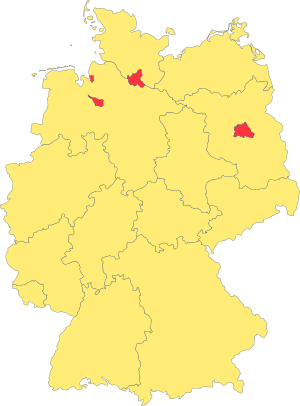 Germany is a country in Central and Western Europe, lying between the Baltic and North Seas to the North. It borders with
Denmark, Poland, Czech Republic, Austria, Switzerland, France, Luxembourg,
Belgium and the Netherlands. Germany includes 16 constituent states and covers
an area of 357,386 square kilometers. With 83 million inhabitants, it is the
second most populous state of Europe after Russia in Europe and the most
populous member state of the European Union. The millions of habitants
use/speak their official language, German (Frisian) as their first language but
there is more different languages that are spoken by foreign people. Germany is
a much localized country. Therefore, the economy of Germany is a highly
prospered of social market. Its capital is Berlin. Germany's largest urban area
is the Ruhr, with its main center of Dortmund and Essen. The country's other
major cities are Hamburg, Munich, Cologne, Stuttgart, Düsseldorf, Leipzig,
Dresden, Bremen, Hannover, and Nuremberg.
Germany is a country in Central and Western Europe, lying between the Baltic and North Seas to the North. It borders with
Denmark, Poland, Czech Republic, Austria, Switzerland, France, Luxembourg,
Belgium and the Netherlands. Germany includes 16 constituent states and covers
an area of 357,386 square kilometers. With 83 million inhabitants, it is the
second most populous state of Europe after Russia in Europe and the most
populous member state of the European Union. The millions of habitants
use/speak their official language, German (Frisian) as their first language but
there is more different languages that are spoken by foreign people. Germany is
a much localized country. Therefore, the economy of Germany is a highly
prospered of social market. Its capital is Berlin. Germany's largest urban area
is the Ruhr, with its main center of Dortmund and Essen. The country's other
major cities are Hamburg, Munich, Cologne, Stuttgart, Düsseldorf, Leipzig,
Dresden, Bremen, Hannover, and Nuremberg.CELEBRATIONS
- New Year’s Day
- White Monday
- Epiphany (annual celebration in Germany on January 6 to mark the Magi's or three wise men's visit to baby Jesus)
- Corpus Christi Day(The day honors the Eucharist/Holy Communion, Lord's Supper, which is important in the Catholic church)
- Good Friday (It is a Christian holiday commemorating the crucifixion of Jesus)
- Assumption of the Virgin Mary(celebration of the virgin Mary who went to heaven after she has completed the course of her earthly life and the most important feast to “the Blessed Virgin,” who gave birth to Jesus Christ
- Easter Sunday - Day of German Unit
- Reformation Day (Protestant Christian religious holiday celebrated on 31 October)
- Labor Day (an ancient festival to welcome the spring weather and to drive away evil spirits
- All Saints Day (Catholics and some Protestants in Germany honor the lives of every saint on All Saints' Day on November 1
- Ascensions Day (a public holiday in Germany to mark the Jesus' ascension to heaven)
- Day of Prayer and Repentance (a public holiday in the state of Saxony, Germany)
- White Sunday (a Christian holiday commemorating the descent of the Holy Ghost)
- Christmas

 Did you know? The country is particularly known for its traditional
Oktoberfest celebrations in Munich, its carnival culture and globally influential
Christmas customs known as Weihnachten.
Did you know? The country is particularly known for its traditional
Oktoberfest celebrations in Munich, its carnival culture and globally influential
Christmas customs known as Weihnachten.
VALUES
The German culture stems from the beliefs and values of its people. The roles that these principles play are evident in a German's everyday life.
The German culture stems from the beliefs and values of its people. The roles that these principles play are evident in a German's everyday life.
Education
They have a deep respect for education, but social status,
and the level of employment a person may reach depends on their educational
achievement.
Manners
Manners
Good manners are a must in the German culture. Displaying politeness and courtesy are ways
of showing respect.
Punctuality
Germans pride themselves on their punctuality. Too many of
them, being on time is not just a simple concern, it is an obsession. Being late to an appointment disturbs their
sense of order and is seen as rude; if you are expecting to be late, call and
explain your situation.
RELIGIONS
German Culture and Mongolian Culture
Our Mongolian traditions have some similarities with German traditions. Both of these countries have a deep history by representing the folk culture. They take prides in their traditional/national events and celebrations. Besides that, these 2 countries believe in different religion, customs of beliefs and culture. Because they are located in different continents and their lifestyles and standard of living are not same. We, Mongolians mostly believe in Buddha religion while utmost of German people are Christians.
Since religion is mainly the biggest part of our lives a lot of people think that it is the general thing to part habitants. Now-a-days some countries are extremely becoming popular by their development (including German) so that proves that even their community has been unalike to Mongolian community.
Amarbayasgalan.B
Bilguun.E
Oyumaa.P
Chinggis.D
Comments
Post a Comment